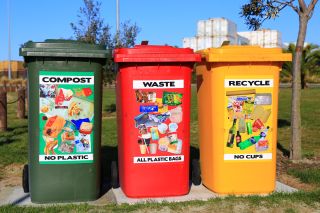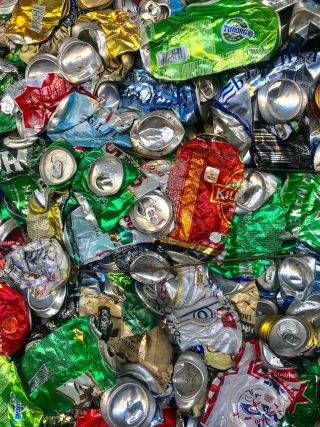Environment
Recycling Isn’t Virtuous; It’s Making Things Worse
On Earth Day and beyond, focus on reducing and reusing, not recycling.
Posted April 21, 2023 Reviewed by Davia Sills
Key points
- Recycling is much less sustainable than people think; yet, recycling continues to be lauded as an ethical means of disposal.
- People gain moral satisfaction from recycling, which can cause harms that counteract the minimal environmental benefits that recycling provides.
- Studies show that people frequently engage in "aspirational recycling" and succumb to the "negative footprint illusion."
Millions of people will wheel recycling bins to their curbs this Earth Day, and many will feel a warm glow for doing their part to help the planet. Being a diligent recycler seems like a simple way to do our part in minimizing destructive waste. But recycling isn't as green as people think. In fact, psychological studies indicate that the moral satisfaction we get from recycling can lead to harm that may counteract the minimal environmental benefits that recycling provides.

Precisely because recycling is widely understood to benefit society and the environment, the mere act of choosing to throw used goods into recycling bins makes us feel that we're being sustainable. This causes many of us to engage in "aspirational recycling": throwing non-recyclable items like plastic bags, Styrofoam, and even soiled diapers into recycling bins rather than garbage cans. Even people who attempt to be conscientious in their waste disposal inadvertently engage in poor recycling habits, partly because it is difficult for consumers to know what is acceptable for recycling.
Better labeling may improve bad habits. Although the recognizable three-arrowed triangular Mobius symbol is typically interpreted as signaling that an item is fit for curbside recycling, this symbol is also stamped on many non-recyclable items, like disposable Solo cups. Some states are starting to restrict inaccurate representations, which should encourage more accurate recycling. But other trends, like increasingly labeling trash cans as "landfill," may continue to facilitate aspirational recycling. As research has demonstrated, labels that reinforce the negative impact of garbage directly lead to more contamination in recycling bins.
Making small mistakes when recycling can have big downstream effects. As a result of aspirational recycling, millions of tons of curbside recycling are diverted to landfills or incinerators. Recently tightened international regulations have made this problem worse.

Even if everyone began to sort their recycling from their garbage correctly, recycling would remain ineffective and inefficient as compared to reducing or reusing. Yet, when people consider the positive outcomes that recycling can have, they feel better about consuming single-use items. One recent study found that people with the option to dispose of plastic in "Waste2Wear" bins that promised to turn plastic bottles into clothing were more likely to selectively use plastic bottles over reusable glass jars. Thus, when people feel that their disposal of recyclable materials contributes to the public good, they engage in more recycling behaviors rather than reducing their purchasing behaviors. This will likely make them more wasteful since recycling will never be more sustainable than curtailing consumption and repurposing what is already owned.
Other researchers have documented a related phenomenon, termed the "negative footprint illusion," in which people mistakenly evaluate sustainable actions as yielding much lower environmental impacts than they really have. Participants in one study falsely believed that purchasing a burger with a sustainable side (an organic apple) is less environmentally taxing than purchasing a burger without a side. Participants in another study incorrectly judged that a family with two hybrid-electric vehicles would have an equivalent environmental impact as a family with only one hybrid vehicle, despite correctly judging that a family with two conventional cars would have a greater impact than a family with one car. Overall, this research underscores what the recycling studies suggest: that people tend to think that frugality is unnecessary for sustainability.
To be clear, we shouldn't stop recycling. However, encouraging recycling by highlighting its virtuousness is prone to backfiring. In some cases, viewing recycling as a moral imperative will directly contravene sustainability. Instead, being green will be better facilitated by considering other (less convenient) behavioral options, particularly reducing consumption. When considering the "Three R's," we should remember that recycling comes last and should be seen as a distant third in sustainable living.


